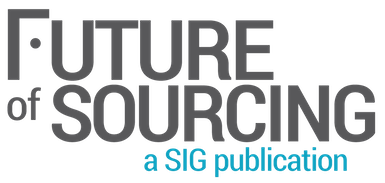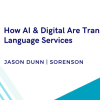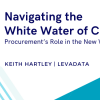Outsource: Nipun, welcome to Outsource. As is customary with our Q&As, let’s begin with some scene-setting: could you please tell our audience a bit about Enlighta and your own role within the organisation?
Nipun Sehgal: Enlighta is a leading provider of supplier performance, risk and compliance, and relationship management solutions enabling enterprises to derive more business value from global and local supplier relationships.
Over the last decade or more, enterprises have significantly increased their reliance on suppliers in non-core and even core business functions; managing of supplier performance, monitoring of contractual and regulatory compliance and assessing and improving relationships is not just a nice-to-have; it is a key differentiator. In most enterprises, the current state is some combination of emails, spreadsheets, home grown tools and supplier provided portals and that is wholly inadequate to drive the level of compliance that auditors are seeking, and the level of engagement that fosters great relationships and innovation.
Our solutions make it easy for vendor managers, executives and supplier stakeholders to be aligned on supplier performance, drive consistency in core governance processes for demand, change and financials review, assess and manage supplier and contract risk and assess the health of strategic supplier relationships. Our solutions have been deployed by Fortune 500 enterprises to manage anywhere from a handful of strategic IT, telecom or BPO relationships to thousands of suppliers and contracts.
At Enlighta, as CEO, I engage with clients and prospects to understand their challenges and gaps, and discuss how our solutions may help. As the product architect, I work with our product teams to define and refine the product roadmap and enable our teams have the talent and resources they need to realise the vision.
O: We originally connected at the SIG Summit in Florida, and you’ve had very positive words to say about the event. What for you were the stand-out elements of that conference?
NS: Rich content and “non-salesy” interaction with conference participants. A few sessions were stand-outs (such as the keynote focus on automation and Bloomberg’s session: content-rich and well presented – good stuff). As in prior SIG Summits, I enjoyed the rapid networking and catching up with industry peers.
O: Enlighta is itself, of course, very much a tech-focussed and -enabled company; what will be the game-changing technologies of the near future for you and others in your space (and how are you positioning your organisation specifically to take advantage of them)?
NS: Most enterprises we engage with are today at the basic blocking and tackling of supplier management grappling with governance design and initial automation.
Imagine the possibilities though: enterprises can benefit from deeper insight into their supplier chain – direct suppliers and their subcontractors, shared services organisations, and other third parties – their capabilities and capacity, their audits and findings, their performance and compliance. The “after the fact” performance reporting and SLA scorecards can be changed to predictive insight into performance and services integration can be automated. Aggregate performance and satisfaction can be measured and compared with industry peers using the same supplier or equivalent suppliers enabling executives to make strategic decisions.
Risk need not be just the result of an annual assessment; it is living and dynamically changing based on internal and external factors and needs to be managed proactively and systematically.
Pricing is not just the result of a one-time negotiation of ratecards, each type of work can be dynamically bid to select internal suppliers without needing a painful RFP process, resulting in a capability- and price-based selection where even the tier-1 suppliers are constantly on their toes working hard to provide the best value to you and new suppliers can be considered based on specific capabilities needed for the work to be performed.
Even the nature of the talent is changing – freelance workers, independent consultants, supplier workers and employees can all be tapped; effectively acquiring talent, managing talent and being compliant all can benefit from tool support.
Innovation need not just come from employees; with so much of the operations being performed by suppliers and third parties, ideas and suggestions can originate from any part of the supply chain and at any level. Social network approaches can make it easier for problems and suggestions to be tracked, assessed and prioritised.
We are working on these and other areas with a singular lens: how can our tools via big data analytics, automation and insight make it easier for enterprises to get more business value from their supplier relationships?
O: How has Enlighta evolved to react to recent developments in the outsourcing space such as the rise of multisourcing, the advent of SaaS, changing deal lengths and sizes etc – has this been the cause of radical change on your side?
NS: Almost every trend in the space is driving enterprises to seek solutions such as Enlighta; multisourcing means multiple suppliers to manage and more complexity in services integration and inter-supplier dependencies that need to be tracked and reported.
We now offer a SaaS solution, dedicated hosting as well as client on-premise deployment options (after Snowden, some European clients consider hosting in USA as a risk!).
With the evolution in outsourcing models, we not only support traditional T&M pricing models, tiered pricing managed services and fixed-price work; we also support more complex ARC/RRC based pricing models – the ability to have a single platform that can handle all these types of work and different types of resources (supplier resources, contractors, freelancers, shared services resources) has become more important.
O: Developments such as those have also been driving change in the governance sphere specifically, of course. In an interview with Outsource earlier this year, Mike Beals, Dean of SIG University‘s College of Governance said that in his opinion "we’re going to a more hybrid delivery environment, organisations are adopting global business services as an overall business model, and the amount of regulation is increasing." Do you agree with that – and how far do you concur with his assessment that “all of these trends point to the fact that we need to recognise governance as a discipline in which organisations have to develop a core competency”?
NS: I've known Mike for many years, and he is spot on. It is not just the traditional services; there is an explosion in SaaS services, data services, with RPA coming up fast. Where does your data reside? Where is the DR? How do you govern robotic processes? How do you measure risk for these? All interesting questions – and for sure, effective governance will make a 10% or higher difference in realised value and that can be a huge ROI.
One of our clients did an assessment of the health of their strategic suppliers using Enlighta’s supplier assessment capability. What they found was interesting – multiple divisions using the very same supplier had a very significant difference in satisfaction and outcome.
My own takeaway is that relationships don’t just auto-magically become great (if they do in some cases, good for them!). There are specific steps, methods, approaches, training and tools that need to be used to make it possible to have a great relationship.
O: Governance is such a big issue – and yet in many agreements it doesn’t receive the attention it should. Why do you think this is, and what tend to be the ramifications?
NS: Procurement and contract managers don’t “govern” the relationship, and as a result the items that dominate the pre-contract stages are pricing, legal clauses and risk mitigation with only cursory thought into how to get the most value from the relationship for the desired business outcome.
In the post-contract world, most executives have a mindset of “if it ain’t a problem yet, what is there to fix?” - suppliers seem to be doing their work and how effective governance can make a difference in realised value is not clearly defined.
There are two issues I have with that logic: a, the problem may be very costly to fix when it does occur – not in just terms of contract value – in terms of the product that did not get delivered, in terms of customer service that was impacted, reputation in the market, etc; and b, just because there is no problem does not mean you are getting the optimum business value from your supplier relationships.
With the increased auditor scrutiny in supplier relationships, the high-profile failures and breaches, and an increase in multisourcing there is bound to be more interest and awareness in training and tools. We are seeing that in the market.
O: One of Enlighta’s solutions covers ITIL service delivery: do you think ITIL is still fit for purpose in the light of the kind of rapid technological advances we’ve spoken about just now?
NS: Our focus is to adapt and leverage the delivery suite for multi-service integration and establish operating level agreements between suppliers as well as end-to-end process level measures.
O: Where do you see potential new Enlighta offerings being focussed in the next few years: what’s the logical next step for you, considering some of the things we’ve been discussing?
NS: There are a few key areas of focus: seamless integration with industry-leading tools in the ecosystem such as contract management systems (Ariba, Oracle); e-signature tools for e-signing (such as DocuSign); delivery tools such as ServiceNow, BMC Remedy; and more. We have most of these interfaces though continue to expand the set of products and services we interface with.
In addition to expanding the existing capabilities in supplier governance, we are focussed on supplier and contract risk as well resource management and have offerings in these areas that will be add-on suites to the core supplier governance suite.
O: Finally, something a little more speculative: if you could change any one thing in your industry, what would it be and why?
NS: The use of best-of-breed SaaS governance tools by suppliers should be mandated contractually for every new contract or renewal of contract whether the supplier is for IT services, BPO services, facilities management or telecom services. While this will clearly add value to clients, it also ends up adding a lot of value to suppliers and advisors. No-brainer in my humble opinion as the cost can then be shared by clients and suppliers and no one organisation would end up footing the entire bill.




